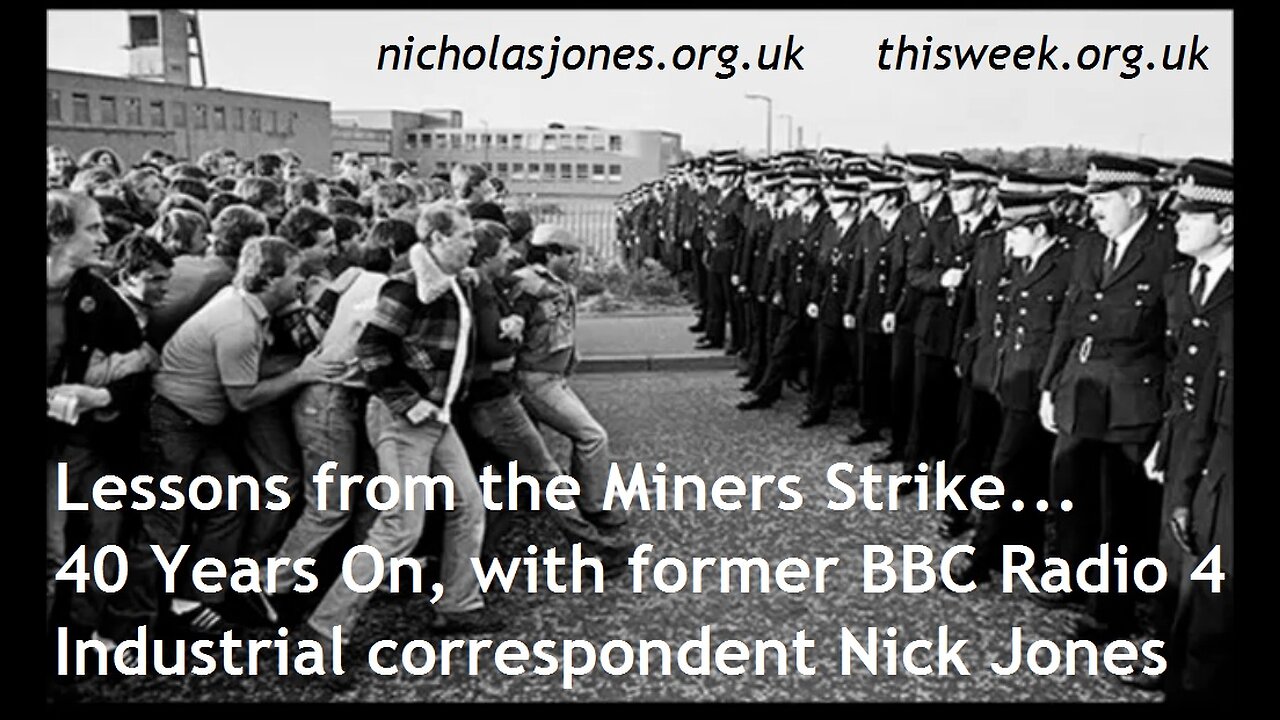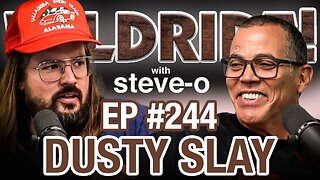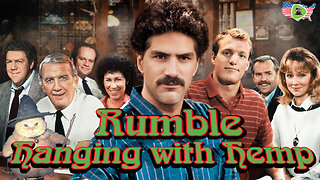Premium Only Content

Nicholas Jones ex-BBC: Miners' Strike 40yrs on Scargill Flying Pickets Industrial Decline Nuclear XR
Troubling questions remain as to why Battle of Orgreave became bloodiest confrontation of unprecedented police operation during miners' strike 06 February 2024
From the start of the strike, the NUM President, Arthur Scargill, had wanted to force the closure of the coke works but initially he was overruled by the union’s executive. Finally, the word went out to local union offices, miners’ clubs, and soup kitchens: the mass picket at Orgreave 18 June was a priority.
The two NUM officials who had been issued with video cameras described what they saw that day and posed questions that were not followed through: Why were the police there in such strength? Who alerted the television crews?
When the National Coal Board and the government were first alerted that Orgreave might become a target the alarm bells had rung.
There was no way that Prime Minister Margaret Thatcher was going to allow Scargill to repeat his 1972 victory when a mass picket closed the Saltley coke works at Birmingham and forced her predecessor Ted Heath to concede a 27 per cent pay rise to the NUM.
Winning “The Battle of Saltley Gate” was – as Scargill has frequently said -- the proudest moment of his life but was acknowledged within the government as a disaster when it came to policing industrial unrest; furthermore, it was a retreat that was seared into the political memory of the Conservative Party.
Although at the time he was a lowly organiser and activist in the mighty Yorkshire NUM, Scargill had seized the initiative and mobilised pickets from local pits to head south for Birmingham and, together with other trade unionists from neighbouring car factories and engineering works, a force of 800 police officer found itself far outnumbered by 30,000 protestors....
....Days after her intervention the police began turning back flying pickets from Yorkshire who were heading south on motorways towards the Nottinghamshire and Midlands coalfields, and pickets from Kent heading north through the Dartford tunnel – this was the first highly visible sign of the co-ordinated response that would result in 18 police forces sending officers to Orgreave.
When her cabinet papers were released in 2014 under the 30-year rule Mrs Thatcher’s micro-management of the dispute was revealed: the South Yorkshire force was given secret authorisation to go on incurring the additional cost of bringing in police reinforcements to Orgreave.
She told the Home Office to give the South Yorkshire force “every support”; in the corner of one document was her hand-written note asking: “Can we provide the funds direct?”
One document which also caught my eye among the many official papers was from the Department of Energy, dated 5 June 1984, which notified the Chief Constable of South Yorkshire that British Steel wanted to clear the remaining 8,000 tons of coke from Orgreave to Scunthorpe by road in the week commencing Monday 18 June – they very day that Scargill had chosen for the mass picket.
The police action needed to be “part of a carefully conceived and well executed operation” … “to minimise any opportunity for the NUM to claim a victory.”
The timing of this government intervention helped to explain why so many police reinforcements were present on 18 June.
Convoys of lorries started taking coke from Orgreave to the Scunthorpe steelworks on 25 May and as the picketing intensified police used riot gear and mounted police for the first time on 29 May; the following day Scargill was arrested for obstruction.
By informing South Yorkshire police on 5 June of that the final clearance of coke from Orgreave would commence on 18 June, the Department of Energy had given the national reporting centre ample time to organise additional support from forces around the country.
There had already been a taste of what was to come at the dress rehearsal on 29 May when South Yorkshire said 41 officers were injured, 28 pickets hurt and 82 arrested.
Sophisticated police surveillance during the strike – including the extensive use of phone tapping – would undoubtedly have picked up news of the NUM’s plan to make Orgreave the focus for picketing on 18 June.
The two NUM officials explained why Scargill had wanted to picket Orgreave from day one. His theory was that if the NUM could stop coke being moved to Scunthorpe it would close the steel works, halt production at other plants and force negotiations that would “resolve the dispute”.
Scargill had made no secret of his intentions when calling for support: “I am asking my members to picket Orgreave in massive numbers to show we are not going to allow them to smash the miners’ strike.”....
-
 1:11:10
1:11:10
Steve-O's Wild Ride! Podcast
5 days ago $2.29 earnedDusty Slay Went From Selling Pesticides To Having A Netflix Special - Wild Ride #244
15.2K1 -
 1:16:02
1:16:02
CocktailsConsoles
3 hours agoBE PART OF THE GAME!!| Death Road to Canada | Cocktails & Consoles Livestream
8.44K1 -
 LIVE
LIVE
Phyxicx
5 hours agoWe're streaming again! - 11/26/2024
296 watching -
 LIVE
LIVE
GamingWithHemp
5 hours agoHanging with Hemp #103
703 watching -
 21:24
21:24
DeVory Darkins
1 day ago $5.07 earnedElon Musk and Tucker Carlson SHATTER Left Wing Media
20.7K29 -
 15:13
15:13
Stephen Gardner
2 hours ago🔥Breaking: Trump JUST DID the UNEXPECTED | Tucker Carlson WARNS America!
17.4K45 -
 1:18:01
1:18:01
Glenn Greenwald
7 hours agoWill Trump's Second Term Promote Economic Populism? Matt Stoller On Cabinet Picks To Fight Corporate Power; Should Liberals Cut Off Pro-Trump Friends & Family? | SYSTEM UPDATE #372
158K125 -
 2:26:30
2:26:30
WeAreChange
7 hours agoTrump To Subdue Deranged Opposition! ARRESTS Planned
126K45 -
 1:19:04
1:19:04
JustPearlyThings
8 hours agoWhy MODERN WOMEN Keep REJECTING The Redpill! | Pearl Daily
97.8K52 -
 1:15:03
1:15:03
Man in America
9 hours agoBig Pharma EXPOSED: The HIDDEN Cures They Tried to Bury
27.8K11